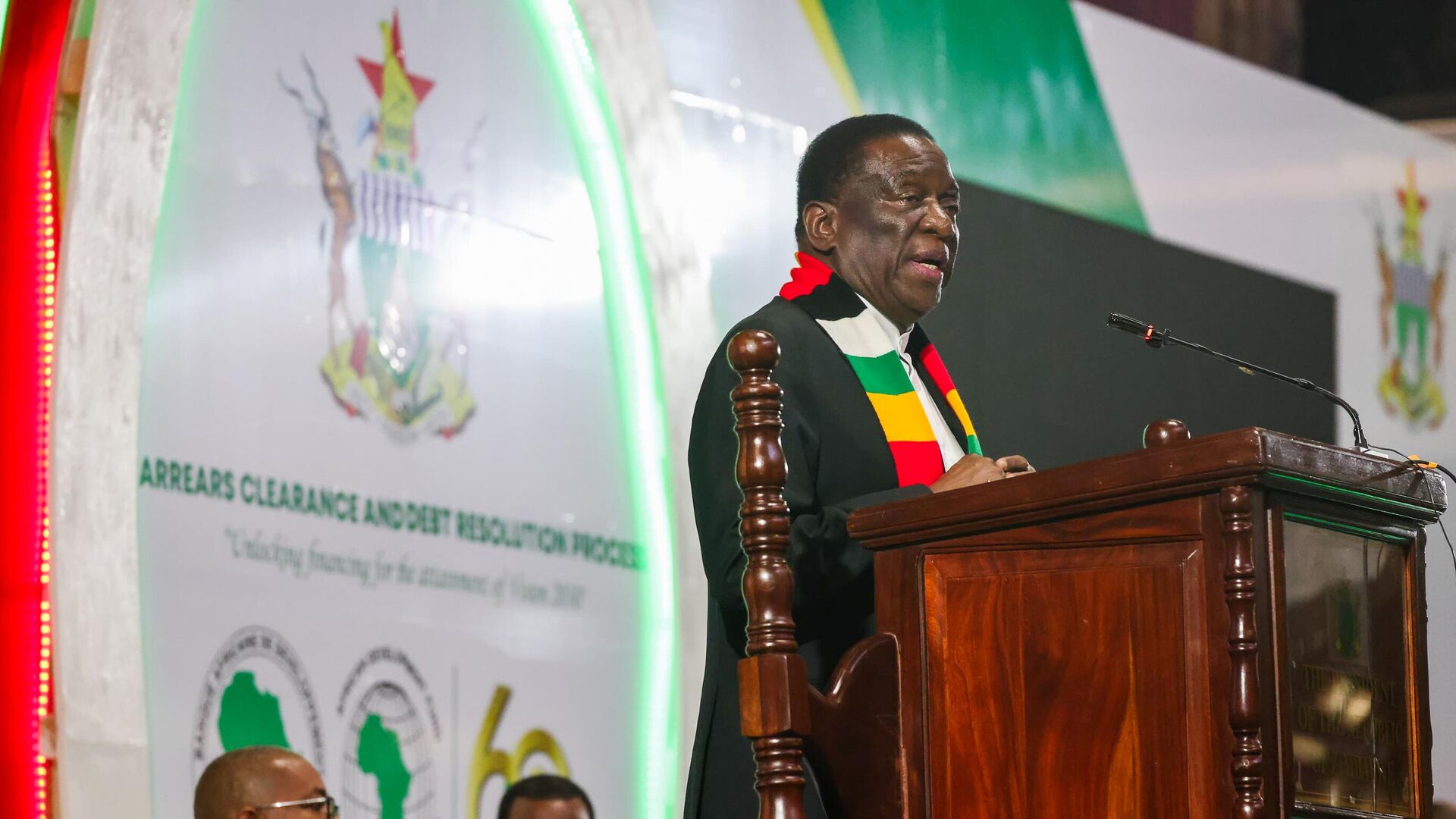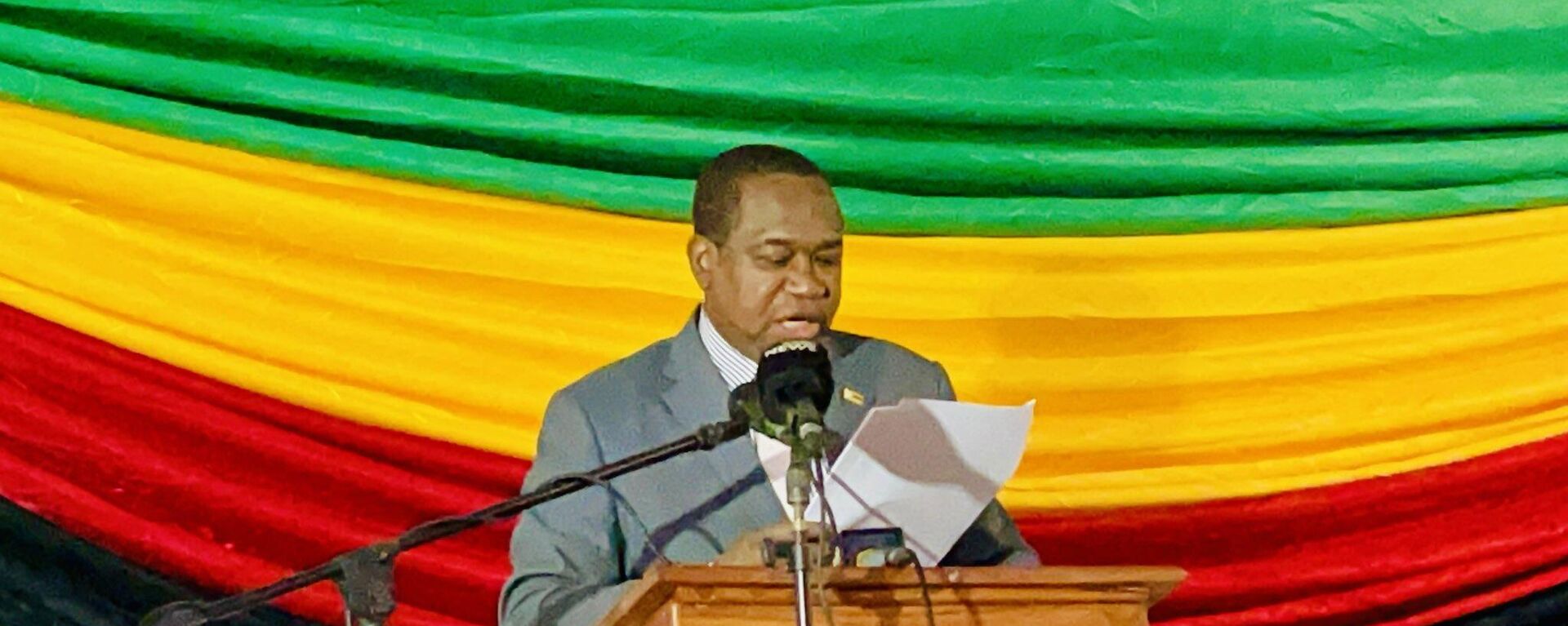https://en.sputniknews.africa/20241125/zimbabwes-mnangagwa-discusses-countrys-21bln-debt-reduction-with-creditors-1069399472.html
Zimbabwe's Mnangagwa Discusses Country's $21Bln Debt Reduction With Creditors
Zimbabwe's Mnangagwa Discusses Country's $21Bln Debt Reduction With Creditors
Sputnik Africa
According to local media, in December 2022, the Zimbabwean government established a Structured Dialogue Platform with all its creditors and development... 25.11.2024, Sputnik Africa
2024-11-25T17:21+0100
2024-11-25T17:21+0100
2024-11-25T18:09+0100
sub-saharan africa
zimbabwe
southern africa
emmerson mnangagwa
president
debt restructuring
conference
economy
https://cdn1.img.sputniknews.africa/img/07e8/0b/19/1069405450_0:0:2741:1543_1920x0_80_0_0_59462a925ae32f5001882bb949a23c57.jpg
On Monday, Zimbabwean President Emmerson Mnangagwa discussed the country's $21 billion public debt arrear and restructuring of $12.7 billion in external debt with creditors and executives of financial organizations during the High Level Structure Dialog Platform conference in Zimbabwe's capital, Harare.Zimbabwe is discussing a Staff Monitored Program with the International Monetary Fund, Mnangagwa said at the conference.African Development Bank President Akinwumi Adesina, who participated in the event, noted that the bank provided a $55 million loan to the private sector of Zimbabwe.According to Adesina, the AfDB also had funds from a special fund ready to assist in paying Zimbabwe's debts. However, he did not provide any numbers. Timelines will be apparent by the middle of 2025, according to Finance Minister Mthuli Ncube at the conference, once Zimbabwe has obtained pledges from lenders for bridging financing to assist in resolving the arrears.According to the media estimates, some of the country's debt obligations are related to payment of $20.4 billion to foreign lenders, payment of $10 billion for land improvements by indigenous Zimbabweans whose land was acquired by the government before 1980, and $3.5 billion for land improvements by white former commercial farmers whose land was acquired by the authorities for resettling the landless majority after 1980.According to a 2023 government presentation, arrears and fines make up the remaining portion of its financial burden, with outstanding debt accounting for 45%.Since assuming office in 2017, President Mnangagwa has assured creditors that his government is committed to the implementation of financial reforms that are important to resolving the country's debt problem, the report added.Earlier, Mthuli Ncube, Minister for Finance and Economic Development of Zimbabwe, said during a lecture at the Zimbabwe National Defense College that the country is expecting 2% growth this year, down from the previous average of 6.8%, due to a dip in agriculture.The minister noted that Zimbabwe's economy has faced challenges due to geopolitical tensions and low commodity prices, particularly impacting fuel imports. While most mineral prices have fallen, gold prices remain strong.
https://en.sputniknews.africa/20241104/zimbabwes-economy-remains-resilient-despite-global-challenges-countrys-minister-states-1069030564.html
zimbabwe
southern africa
Sputnik Africa
feedback@sputniknews.com
+74956456601
MIA „Rossiya Segodnya“
2024
News
en_EN
Sputnik Africa
feedback@sputniknews.com
+74956456601
MIA „Rossiya Segodnya“
Sputnik Africa
feedback@sputniknews.com
+74956456601
MIA „Rossiya Segodnya“
zimbabwe, southern africa, emmerson mnangagwa, president, debt restructuring, conference, economy
zimbabwe, southern africa, emmerson mnangagwa, president, debt restructuring, conference, economy
Zimbabwe's Mnangagwa Discusses Country's $21Bln Debt Reduction With Creditors
17:21 25.11.2024 (Updated: 18:09 25.11.2024) According to local media, in December 2022, the Zimbabwean government established a Structured Dialogue Platform with all its creditors and development partners to institutionalize dialogue on economic and governance reforms to underpin the arrears clearance and debt resolution process.
On Monday, Zimbabwean President Emmerson Mnangagwa discussed the country's $21 billion public debt arrear and restructuring of $12.7 billion in external debt with creditors and executives of financial organizations during the High Level Structure Dialog Platform conference in Zimbabwe's capital, Harare.
"I was honored to officiate at the High-Level Structured Dialogue Platform, advancing efforts to resolve Zimbabwe’s US$21 billion debt. Significant progress is being made through economic reforms, improved governance, and land tenure security via 99-year leases," the president said on X.
Zimbabwe is discussing a Staff Monitored Program with the International Monetary Fund, Mnangagwa said at the conference.
African Development Bank President Akinwumi Adesina, who participated in the event, noted that the bank provided a $55 million loan to the private sector of Zimbabwe.
"We now need to collectively agree on a timebound plan to deliver the arrears clearance and debt resolution; it will be critical for one country to champion the process," he said, as quoted by the media.
According to Adesina, the AfDB also had funds from a special fund ready to assist in paying Zimbabwe's debts. However, he did not provide any numbers.
Timelines will be apparent by the middle of 2025, according to Finance Minister Mthuli Ncube at the conference, once Zimbabwe has obtained pledges from lenders for bridging financing to assist in resolving the arrears.
According to the media estimates, some of the country's debt obligations are related to payment of $20.4 billion to foreign lenders, payment of $10 billion for land improvements by indigenous Zimbabweans whose land was acquired by the government before 1980, and $3.5 billion for land improvements by white former commercial farmers whose land was acquired by the authorities for resettling the landless majority after 1980.
According to a 2023 government presentation, arrears and fines make up the remaining portion of its financial burden, with outstanding debt accounting for 45%.
Since assuming office in 2017, President Mnangagwa has assured creditors that his government is committed to the implementation of financial reforms that are important to resolving the country's debt problem, the report added.
Earlier, Mthuli Ncube, Minister for Finance and Economic Development of Zimbabwe, said during a lecture at the Zimbabwe National Defense College that the country is expecting 2%
growth this year, down from the previous average of 6.8%, due to a dip in agriculture.
The minister noted that
Zimbabwe's economy has faced challenges due to geopolitical tensions and low commodity prices, particularly impacting fuel imports. While most mineral prices have fallen, gold prices remain strong.


